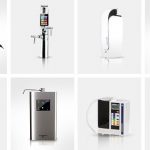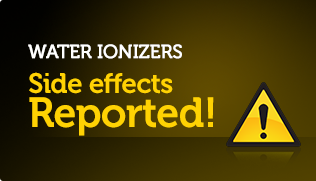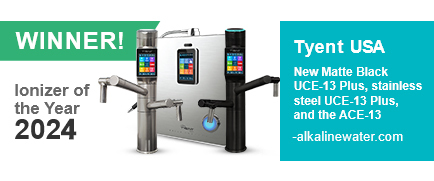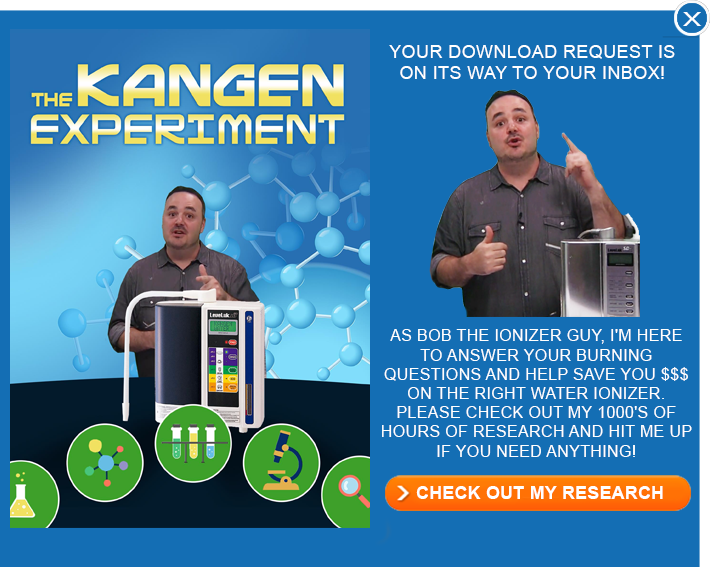Water ionizers are all the rage these days and for very good reasons. There have…
Water Ionizers Broken Down by Parts
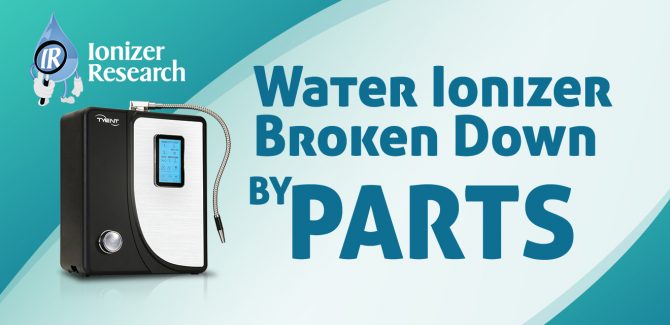
If you’re looking to buy a new water ionizer for your home, or if you already own one, you might be wondering how a water ionizer works or what makes it so special? Well, in this blog I’ll show you actually what happens inside a water ionizer and share some knowledge with you about the internal components of a water ionizer.
What is a water ionizer?
For those who don’t know, a water ionizer is an electrical appliance that converts your normal tap/source water into clean, ionized alkaline water through the process of electrolysis. If you use a quality water ionizer, your water will contain molecular hydrogen as well, which is a powerful antioxidant.
Water Ionizer – Plates
Plates are one of the most important parts of a water ionizer. A quality water ionizer’s plates are made up of titanium and are coated with a layer of platinum. When a water ionizer is running, as the water flows past these plates, electrolysis occurs on the surface of these plates producing ionized water.
The plates themselves come in 3 different designs:
- Solid Plates
- Mesh Plates
- Solid/Mesh Hybrid Plates
Solid Plates
Solid plates are known for their durability and were quite popular with ionizer brands in the past. Although quite durable, they’re not very good at conducting electricity and reduce the overall quality and efficiency of a water ionizer. Most new water ionizers do not use solid plates anymore.
Mesh Plates
Mesh plates are very good at conducting electricity because of their large surface area. Ionizers using mesh plates are very good at saving energy. The mesh-like design of these plates increases the overall water quality and performance of the ionizer. However, the drawback of mesh plates is that they are not as durable as solid plates and can be damaged easily.
Solid/Mesh Hybrid Plates
Solid/Mesh hybrid plates are used by only a few companies because they’re relatively more expensive. The design used in these plates is a combination of both solid and mesh plates. The hybrid design makes them both durable and more efficient. If you decide to buy a water ionizer, the best option for you is to get an ionizer that uses solid/mesh hybrid plates.
Water Ionizer – Filters
Almost all water treatment systems have a filtration system in place and water ionizers are no exception to this. Alkaline water is good for your health but let’s face it, if the water has impurities such as heavy metals or disease-causing bacteria, it won’t do you much good and would be detrimental to your health. Because of this, most good water ionizer companies have a filtration system in place to purify the water before it’s converted to alkaline water.
When water flows through an ionizer, it first passes through the filters. Some water ionizers have a single filter installed for filtration but generally, good ionizer companies use a dual filtration system in their ionizer models. Water ionizers with dual-filtration are highly recommended because they do a much better job of purifying the water than single filter ionizers.
Ultra-filtration is the preferred filtration process recommended for water ionizers. Ultra-filtration is carried out through a 0.01-micron filter. These filters have a pore size of just 0.01 micrometers and can filter out suspended solids, heavy metals and other harmful chemicals such as chlorine. This is the same filtration standard used in kidney dialysis machines. At present, only a few ionizer models use this filtration method.
Some water ionizer models also use ceramic-based filtration media. These ceramic filters can remove harmful bacteria from the water.
Filters in water ionizers wear out over time so it’s important to have them replaced after specific time periods as recommended by the ionizer manufacturer.
Water Ionizer – Computerized Control Systems
Some of the latest water ionizer models in the market have their own modern computerized control systems. Recent water ionizer models from companies such as Tyent have a built-in pH regulator. Since source water quality varies depending on where you live, pH levels may also vary. A pH regulator comes in handy in such situations. It allows ionizer users to change the pH of the alkaline water to what best suits them.
The most high-end ionizer models have the most sophisticated control systems and have an array of smart features. For example, the Tyent ACE 13 water ionizer has some really cool features. The ACE 13 ionizer has a touchscreen interface much similar to what you see on a smartphone. It has other features too such as voice assistance, voice commands, and the auto-fill sensor which will automatically fill your glass once you bring it under the ionizer’s water outlet.
Now, that you know what goes on inside a water ionizer, how about you tell me about your own water ionizer? Which ionizer brand and model do you own and what do you like most about your water ionizer? Leave me a comment! If you don’t own a water ionizer, it’s never too late for you to join the club. I can help you make a decision on which water ionizer to buy. Just give me a call at 1-877-878-7220. I’d be happy to hook you up with a good quality water ionizer.
View this post on Instagram

3 Tips to Becoming a Dealer—My Story
Ever think about selling water ionizers? Wondering if there is money to be made? The truth is...
Read More 1-877-878-7220
1-877-878-7220 